|
|
|
Sort Order |
|
|
|
Items / Page
|
|
|
|
|
|
|
| Srl | Item |
| 1 |
ID:
097930
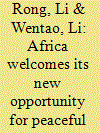

|
|
|
| 2 |
ID:
104675
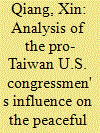

|
|
|
| 3 |
ID:
145569
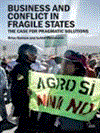

|
|
|
|
|
| Publication |
London, Routledge, 2016.
|
| Description |
230p.pbk
|
| Series |
Adelphi Paper no. 457-458
|
| Standard Number |
9781138213975
|
|
|
|
|
|
|
|
|
|
|
|
Copies: C:1/I:0,R:0,Q:0
Circulation
| Accession# | Call# | Current Location | Status | Policy | Location |
| 058695 | 363.32/GAN 058695 | Main | On Shelf | General | |
|
|
|
|
| 4 |
ID:
075470
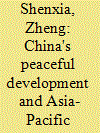

|
|
|
| 5 |
ID:
169511
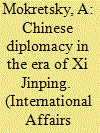

|
|
|
|
|
| Summary/Abstract |
THE 19TH CONGRESS of the Communist Party of China (CPC) was held on October 18-24, 2017. Chinese media noted that the Congress took place was open and global in nature: It was covered by more than 3,600 journalists, including 1,818 correspondents from Hong Kong, Macau, Taiwan and 134 countries. In addition, the idea of "comprehensively covering an event of global significance" was presented as broadcasting China's voice to the world and explaining the country's plan for future development.
|
|
|
|
|
|
|
|
|
|
|
|
|
|
|
|
| 6 |
ID:
111553


|
|
|
|
|
| Publication |
2011.
|
| Summary/Abstract |
The White Paper titled China's Peaceful Development is both a paper of declaration and a guideline of action for China's peaceful development. China's peaceful development is based on China's long and profound historical and cultural tradition. We have found this path in the course of the more than 60 years since the founding of the People's Republic of China, especially in the course of the great experiment of reform and opening-up. China's declaration of commitment to peaceful development is a sincere and conscientious long-term strategic choice based on China's basic national conditions. Peaceful development is a carefully considered choice based on calm analysis and sound judgment of the current situation in the world. China's declaration of peaceful development is a choice supported by firm political policies and strategies. China's exploration and practice of following the path of peaceful development will be a never-ending process of constant exploration and improvement. China's path of peaceful development involves more than China itself, and it needs the understanding, support and cooperation of the international community. China's strategic intention for peaceful development is transparent, the goal it pursues is lofty, and its policies are clear-cut. The attitude of China is sincere, its determination is firm and what China says will be honored.
|
|
|
|
|
|
|
|
|
|
|
|
|
|
|
|
| 7 |
ID:
111555


|
|
|
|
|
| Publication |
2011.
|
| Summary/Abstract |
The White Paper on China's Peaceful Development is both a candid statement of China's strategic intentions and a new strategic starting point for China's future course. For the first time ever, the white paper equates the path of China's peaceful development with the path of socialism with Chinese characteristics, explaining why China's peaceful development is essentially internally driven. By reviewing practices in the past and through theoretical innovations, the white paper establishes that the path of peaceful development is chosen based on the fundamental interests of the 1.3 billion Chinese people. China's development in each and every stage has always given new impetus to peace and development in the world. The internal driving forces behind China's development have been transformed into conditions for sustainable peace and development of the world. This path, which is unique to China and significant for the world, brims with great vitality.
|
|
|
|
|
|
|
|
|
|
|
|
|
|
|
|
| 8 |
ID:
130611
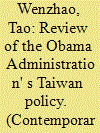

|
|
|
|
|
| Publication |
2014.
|
| Summary/Abstract |
Since May 2008, relations across the Taiwan Strait have experienced a Historical turning point. The two sides of the strait have tided over a "high-risk" period and embarked upon a path of peaceful development and benign interaction. When the Obama administration came to power in January 2009, the new situation in cross-straits relations had already taken hold. By then, the US. was busy coping with a series of challenges both at home and abroad, including tackling the ?nancial crisis and seeking to end the two wars in Iraq and Afghanistan. So, it can be said that the Taiwan issue was neither a priority in Obama's foreign strategy, and that he did not expend as much energy on it as his predecessor.
|
|
|
|
|
|
|
|
|
|
|
|
|
|
|
|
| 9 |
ID:
126632
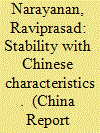

|
|
|
|
|
| Publication |
2013.
|
| Summary/Abstract |
Even as Xi Jinping begins to make his personal imprint on Cross-Strait relations, he has to contend with his predecessor, Hu Jintao's policy towards Taiwan that generated a modus vivendi, acting as a precursor to a slew of trade related agreements between the two sides leading to the ECFA in 2010. On Taiwan, the 'status quo' aspect of Cross-Strait relations has assumed overwhelming consensus with calls for deeper economic engagement with the mainland. Broadly, a template with its own characteristics emerges of a selective reconciling of differences with certain accommodations of interests making the Cross-Strait relations a unique model. This article situates Cross-Strait relations during Hu Jintao's term from 2002-2012, and advances the proposition that the mechanics of an eventual integration are underway with deeper economic cooperation being the first phase of a comprehensive framework under construction. To Beijing, its behaviour on Cross-Strait issues is intrinsic to its announced process of 'peaceful development'. However, the 'relative' success of the on-going process of economic integration does not have to be interpreted as an overwhelming endorsement of the methodology adopted, since closer relations with the mainland is a deeply divisive and politically charged issue in Taiwan
|
|
|
|
|
|
|
|
|
|
|
|
|
|
|
|
| 10 |
ID:
126245
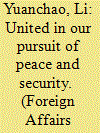

|
|
|
| 11 |
ID:
190077
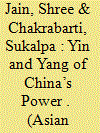

|
|
|
|
|
| Summary/Abstract |
The Pew Research Center survey reports an increasing unfavorable view of China worldwide. In the Soft Power 30 index, China fares at a rank of 27th, far behind its aim of global leadership. The world’s leading economic power (in terms of purchasing power parity), a military power second only to the United States, a nation with a formidable global presence, a robust civilization and culture, however, still struggles to generate international affinity and credibility one might expect of the great middle kingdom. Acknowledging the benefits of soft power, China has continuously been engaged in the competitive politics of attraction, legitimacy, and credibility; however, Beijing’s charm offensive still has limited appeal in the outside world. The popular assessments point toward China’s authoritarian political model or poor state of civil liberties for the limited effectiveness of its soft power push. However, in this article we argue that besides the political and ideological factors limiting its soft power, China’s absolute or relative soft power gains are majorly undercut because of its coercive diplomacy exercised with the unbridled pursuit of its core national interests and hyper-nationalism. The article provides an interpretive illustration of how China’s disposition to rely on hard power instruments of carrot (inducement) and stick (threat, coercion, or intimidation) to get desired outcomes undermines the quest and effect of its soft power.
|
|
|
|
|
|
|
|
|
|
|
|
|
|
|
|
|
|
|
|
|